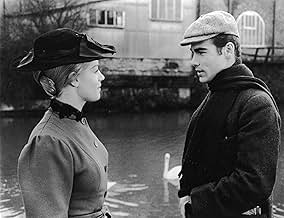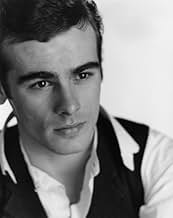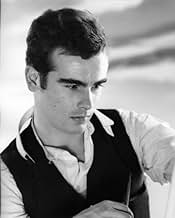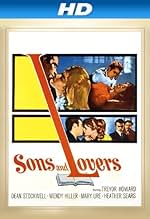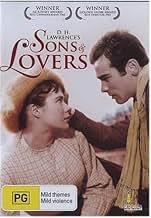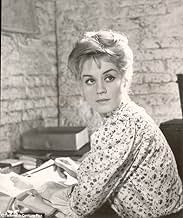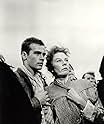Agrega una trama en tu idiomaA young man with artistic talent lives in a close-knit coal-mining town and finds himself inhibited by his emotionally manipulative mother.A young man with artistic talent lives in a close-knit coal-mining town and finds himself inhibited by his emotionally manipulative mother.A young man with artistic talent lives in a close-knit coal-mining town and finds himself inhibited by his emotionally manipulative mother.
- Dirección
- Guionistas
- Elenco
- Ganó 1 premio Óscar
- 8 premios ganados y 16 nominaciones en total
- Dirección
- Guionistas
- Todo el elenco y el equipo
- Producción, taquilla y más en IMDbPro
Opiniones destacadas
The other star is that great actress Wendy Hiller. Her role is far from entirely sympathetic. She suffocates her favorite son, well played by Dean Stockwell. She is demanding in a quiet way and selfish in a manner passing itself off as martyrdom. But what a gorgeous performance! Mary Ure was a fine actress. Somehow, though, the character she plays doesn't entirely work in my view. It seems more from kitchen-sink realism, like the Shelagh Delaney plays that were filmed around this time. (And where have they gone? Why don't we ever see "A Taste of Honey" or "The Leather Boys" anymore?) Heather Sears is good but I have to admit, to my embarrassment, I found it hard to shake her excellent performance in the tile role of "The Story of Esther Costello" from my mind. Her being a bright young woman taken with Stockwell, therefore, startled me throughout. That is my own failing and surely not hers.
This is a superb movie. All of it is good. But for me, the scenes involving Hiller are the most compelling. Howard, too, is superb. And Stockwell as Paul. The family story is heart-wrenching.
D. H. Lawrence is at an all time low in popularity--both his books and the movies based on them. Why? Good question. It's more than just passing tastes. I think it has to do with the precious boundary breaking that once made Lawrence a daring darling of the literary set. Sexual taboos have since been so radically eclipsed, from Henry Miller to John Updike, not to mention hundreds of less mainstream authors, Lawrence is almost stuffy and pretentious.
Or so it would seem. "Sons and Lovers" is a love story set in a tough mining town in England early in the 20th Century. It's filled with the longing of a man to rise out of these pits and be "something" in the world--namely, a successful painter. The girl who loves him is overly devoted, and after a tryst (that was the radical part) there is a falling apart of things. How true this can be! I mean, this is great stuff--a sensitive story about the feelings most of us have had, where desire is mistaken for something deeper, where the world is calling and love, or shades of love, are not enough to keep you home.
The filming is straight out of the gritty, short period of British films known rough as the British New Wave or the Angry Young Men (or both). These films, a grown out of French New Wave and early Italian neo-realism, were a reaction against the slick and vacuous big studio filmmaking (Hollywood especially) from this period. There are more typical films from this group than "Sons and Lovers" but it's certainly part of that mood, looking at working class life, filming with great economy and directness, and using actors in a realistic, vaguely documentary way. For insight into this kind of film, try "Loneliness of a Long Distance Runner" or "Look Back in Anger." Even the first Beatles film, oddly enough, is influenced by this movement ("A Hard Day's Night"), in the raw, fast, black and white style.
But if that's the context, you still have to ask if this film is any good. And the answer is quite. It's a big movie, a deep movie, emotional and deeply serious. It is sad, too, overall, or perhaps melancholy is a better word, and this gloom is slightly wearing after a bit. Some people will find that talking about love is a peculiarly British and indirect way of being in love--the literary overwhelms the truth.
Director Jack Cardiff is a cinematographer above all. This might explain the visual emphasis, the sublime, restrained photography. Lead young actor Dean Stockwell is a perfect visual cast, and he really is good, somehow, in a way that is convincing, though he isn't always commanding. A small part of me didn't care what happened to anyone in the movie. It was all plain to see, and I knew what I was supposed to feel, but I didn't always get the force of those feelings.
The movie, like the book, is patient and deliberate, and quite nuanced and beautiful.
It then seemed to vanish, at least for me, until, amazingly, the American Cinematheque in Los Angeles screened it on a Monday night some months ago. I was extremely impressed with it again, especially the BxW CinemaScope cinematography (and I agree, wide-screen is the way to see this rare film, if indeed you ever can).
So many thanks to the Cinematheque for this unusual revival.
RE the musical score (by Italian composer, Mario Nascimbene): actually the theme was so melodic Percy Faith recorded it as a follow-up to his hit single of Max Steiner's SUMMER PLACE theme, (complete with similar 1950s piano triplets in the accompaniment!) In spite of the nod to '50s pop the SONS AND LOVERS theme was not a hit, but it remains one of the more lyrical (and obscure) movie themes from this period.
Remember when movies actually had original musical themes????
Ultimately I feel SONS AND LOVERS ranks with Russell's WOMEN IN LOVE in the admittedly small canon of excellent cinematic Lawrence adaptations.
It's also one of the adult Dean Stockwell's best roles, a long, long day's journey away from the almost too adorable, curly headed moppet in ANCHORS AWEIGH.
There is an excellent script by Gavin Lambert aided by T.E.B. Clarke, which does a fine job of putting into 103 minutes a long, complex novel. Each scene in this film has a purpose to reveal character and make thematic points. There are no wasted scenes or aimless dialogue, yet the dialogue and action all seem natural. The characters are real and immediately involved me.
There is a complexity to the characters. Paul's mother wants the best for him, yet at the same time she wants him for herself. Paul both wants to be free of his mother and is inextricably bound to her, so much that he refuses an all-paid education at a London art school to stay home with her, saying he doesn't want to see her alone with her abusive husband.
Gertrude and Walter Morel's marriage is a complex one that befuddles Paul as he tries to understand the complex connection between the sensitive mother and the outwardly angry, rough father, who is, underneath, a very sensitive man, too. Walter fully understands the close relationship between his wife and Paul and knows he's locked out of that. He's both jealous of and angry at their closeness.
Many excellent scenes here could stand alone. One such is the scene leading up to Paul and Clara having sex for the first time. There is good use of close-ups here in which Clara and Paul must convey much with their eyes.
A certain restraint to the performances here give the characters an intensity they might not have were their performances more flamboyant, if they'd been given "big" scenes to play with shouting, tears, and so on.
The cast in this film is perfect. I don't know of another film about which I could make that statement. I don't see a single poor performance. I can't imagine any other actors doing these roles. Each one fully inhabits the character that he/she is playing. It was a pleasure to see Heather Sears and Mary Ure again; both died far too young. And Dean Stockwell is at his youthful, handsome best. Wendy Hiller and Trevor Howard are both excellent. The excellence extends to the supporting players.
The film is beautifully photographed in black and white. I'm sure this derives partly from director Jack Cardiff's background as a photographer, though Freddie Francis was the cinematographer here and won an Oscar for his work. Gavin Lambert and cast members Hiller and Howard didn't think much of Cardiff as director, whom 20th Century Fox forced upon producer Jerry Wald. Hiller and Howard both said they directed themselves throughout the film.
The film was made in Cinemascope and should be seen in that form, for it doesn't scan well. (Another IMDb commentator has written well about this; see his comments.) Cardiff made good use of close-ups, but every part of this film is excellently framed, the positions of the characters in the frame, their relation to various items in the landscape. And the landscape adds a lot to the mood of the film.
The film has an excellent score (It should be seen in a theatre with a fine sound system), but it is not overscored, and the theme song doesn't become intrusive. This theme never became a hit like the theme from "A Summer Place" did, though the theme did turn up on a number of instrumental albums back in the 60s. People often didn't know from what film it came.
I'm glad to know this film and appreciate its virtues.
The film will probably send viewers to the novel, where they can find complete details about the Morel family yet also realize how well the film conveys the novel.
A PBS version of this novel, starring Eileen Atkins as Gertrude Morel, Tom Bell as Walter Morel, and Karl Johnson as Paul, was shown in 1981. It has never been shown subsequently on PBS or elsewhere to my knowledge nor was it ever issued on video. Was it that bad?
¿Sabías que…?
- TriviaDean Stockwell was cast at producer Jerry Wald's insistence to help the film's chances of distribution in the United States.
- Citas
Miriam: You know, my mother disapproves more and more of the books you bring. She blames you for putting ideas into my head.
Paul Morel: Does she think heaven frowns on ideas? Your mother breathes religion through her nostrils!
Miriam: Do you think that's wrong?
Paul Morel: It's not religious just to be religious! I think a crow is religious as it sails across the sky. It's showing the glory of God but it doesn't know it. God doesn't know things, he is things.
- ConexionesFeatured in Cameraman: The Life and Work of Jack Cardiff (2010)
Selecciones populares
- How long is Sons and Lovers?Con tecnología de Alexa
Detalles
Taquilla
- Presupuesto
- USD 500,000 (estimado)
- Tiempo de ejecución1 hora 43 minutos
- Color
- Relación de aspecto
- 2.35 : 1
Contribuir a esta página



